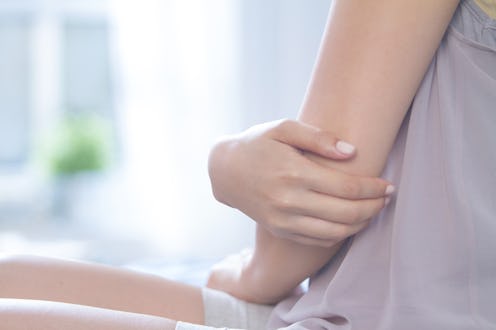Fashion
9 Things Your Skin Can Tell You About Your Health
It may not have a voice, but your skin is incredibly vocal. If you pay attention and know what to look for, there are tons of things your skin can tell you about your health. Once you know what to notice, you’ll be amazed at just how much your body is able to express what it needs.
I first learned how communicative my skin could be at the beginning of my senior year of college. I was starting to sketch out my senior honors thesis and filling out research grants while also trying to stay on top of class readings and drinking five cups of coffee a day. I was also going through the shittiest break up of all time. That's when I broke out in hives.
I’ve never had hives before, and they were insanely itchy and blotchy. Over-the-counter creams weren’t helping, so I ended up having to hit up the campus doctors to basically be like, “Um, what is wrong with me!?” Once allergies were ruled out, they gave me some helpful creams, but also advised I consider seeing a therapist. Apparently stupid amounts of stress triggered the hives and learning how to sift through my anxiety would be far more helpful in treating my skin struggles than any cream. Lesson learned.
Whether emotional or purely physical, your body is always sending you lots of signs. Here are several things to look out for and what they might mean:
1. Dry Skin Could Mean Omega-3 Deficiency
If moisturizers aren't soothing your dull, dry skin this winter, it might be time to look at your diet. Francesca Fusco, MD, assistant clinical professor of dermatology at Mount Sinai Medical Center in New York City told Oprah, "[Omega-3s] play a vital role in ... strengthening cell membranes and regulating cell turnover, which ensures skin stays hydrated and radiant." A deficiency can slow the natural exfoliation cycle, resulting in dryness—even dandruff." If your diet is lacking in crucial omega-3s, reach for walnuts, willd caught salmon, flaxseeds, and soybeans.
2. Pimples Could Mean Stress
There is, in fact, a scientific correlation between that deadline and the number of pimples on your face. According to Shelley Sekula-Gibbs, MD, clinical assistant professor of dermatology at Baylor College of Medicine in Houston, "[During development in the womb], the brain and skin are derived from the same cells, so there is a connection." Gibbs went on to add, "And the other immediate relationship is that when people experience stress in life, quite frequently, their skin becomes a reflection of the stresses." If you feel tense, a combo of sensitive skin face wash and yoga might be your best defense.
3. Crow's Feet Might Mean You Need Glasses
"If you have crow's feet around the eyes, you may be squinting too much and either need eyeglasses, or sunglasses if you're driving during peak sun hours," dermatologist Tanya Kormeili, MD told Bustle over email.
4. Paleness Could Be Anemia
A common (and very curable) cause of sudden paleness could be anemia, meaning your red blood cell count is low. Add folate, B12, and iron-rich foods like red meat, beans, and dark leafy greans to your diet and your glow should come back.
5. Stubborn Jawline Pimples May Be Polycystic Ovarian Syndrome
Dealing with consistent and deep pimples on the lower third of your face? Bethanee Schlosser, MD, director of the women's skin health program at Northwestern University's Feinberg School of Medicine, told WebMD, "Patients with PCOS tend to get acne that involves more tender knots under the skin, rather than fine surface bumps, and will sometimes report that lesions in that area tend to flare before their menstrual period." If this sounds familiar and you also have irregular periods, consider reaching out to your doctor to determine if PCOS is causing your breakouts.
6. Orange-Tinted Skin Could Mean A Thyroid Problem
Beta-Carotene, an antioxidant found in many fruits in vegetables (especially carrots!), is processed by your thyroid. However, if you're suffering from hypothyroidism, your skin can take on an orange hue because your body isn't digesting the antioxidant quick enough. Chat with a doc if you think your skin has taken on a distinctively orange tint and you also feel consistently sluggish.
7. Itchy Blisters Could Be Caused By A Gluten Allergy
You might be over the whole "gluten-free trend," but some people legitimately are allergic to gluten and suffer from celiac disease. A common symptom of gluten allergies include clusters of small and incredibly itchy blisters often found near your elbows, knees, booty, and face. If over-the-counter creams aren't soothing the rashes, definitely check in with a dermatologist.
8. Flaky & Tight Skin Might Mean You're Super Dehydrated
Beyond possible omega-3 deficiencies, another common cause of tight, dry skin is simply dehydration. Purchase a water bottle you really like so that you'll be more motivated to sip throughout the day and stay hydrated!
9. Freckles Could Mean Too Much Sun Exposure
Repeated sun exposure can lead to freckles, especially on the face and chest. If your freckles are recent, start adding more SPF and definitely reach out to your doctor if a freckle starts changing. Skin cancer isn't caused by freckles, but changing ones can be a possible indicator.
Want more beauty tips? Check out the video below, and be sure to subscribe to Bustle’s YouTube page for more hacks and tricks!
Images: Praiwan Wasanruk/Fotolia, aleshin/Fotolia, boyloso/Fotolia, Jet Cat Studio/Fotolia, JEAN-SEBASTIEN EVRARD/AFP/Getty Images, Alfie Goodrich/Getty Images, Sean Gallup/Getty Images, Dan Kitwood/Getty Images, Giphy
